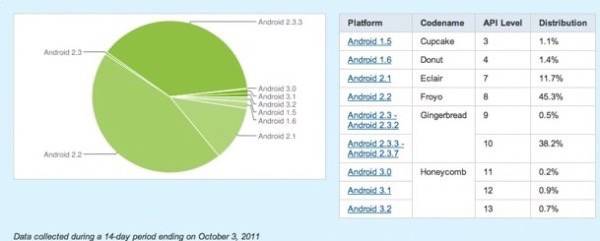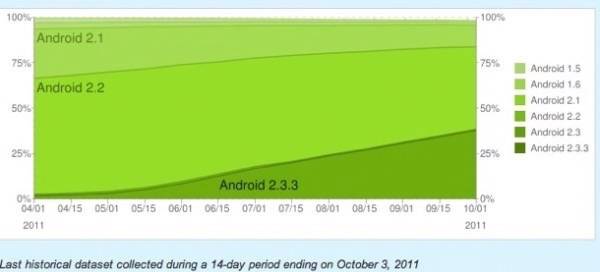The Android fragmentation numbers for October have been released by Google and it looks like Gingerbread updates are accelerating. All Gingerbread versions from 2.3.3 and up gained 7.5% between September and October while Frozen Yogurt 2.2 declines a commensurate amount, down from 51.2% to 45.3%. That is the first time since Gingerbread has been available that Froyo has not been on more than 50% of all Android smartphones.

The rise of Gingerbread is also correlated to dropping numbers in version 2.1 and below. Éclair went from 13.3% to 11.7% and will likely continue to dwindle as more consumers either upgrade their phones or the mass of market consumers buy phones with Gingerbread pre-installed. Honeycomb also saw a jump, with now a 1.8% slice of Android, up from 1.4% in September. Check out the charts bellows.
There are several reasons for the jump of Gingerbread. One of the biggest factors is probably that the most powerful and popular Android phone released in recent memory, the Samsung Galaxy S II, has been flying off shelves worldwide within the last month or so. There are several other hot phones out there as well, like the Droid Bionic and the HTC Thunderbolt.

It is important for Google and the Android ecosystem to accelerate Gingerbread adoption and expunge the low end of the user base. The next version of Android, Ice Cream Sandwich, may be released as early as next week at the CTIA Enterprise and Applications conference in San Diego (we will be there and there is one Samsung event that we are particularly focused on). Most Android applications are designed for Android 2.1 and above (even though Éclair was basically a blip on the road) and Ice Cream Sandwich will have difficult bringing anything below 2.1 into the fold as it attempts to clean up the ecosystem.
Éclair and below still makes up 14.2% of the ecosystem, a number Google should find unacceptable, especially as those phones are accessing the Android Market and likely finding apps that do not work on their phones. Granted, there is a significant portion of the iOS ecosystem that is still functioning with outdated versions.

Android has a poor history of upgrading well. For instance, Samsung has been known to be slow in upgrading its array of Galaxy S devices and once phones are upgraded they tend to not work as well as they did before. Hence, some people who were keen on upgrading once may not be so keen to do it again. While Android is a powerful OS, the motto “it just works” does not always apply.

















